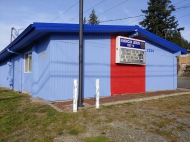
The American Legion Auxiliary Poppy Program, begun in 1921, joins the visual image of the poppy, as a symbol of the service and sacrifice of our veterans, with a fundraising program to aid our veterans.
The official purpose of the Poppy Program is to elevate community awareness and respect for our veterans by educating our membership and the public about the poppy's significance and the financial benefit realized by our nation's veterans as a result of its distribution.
Poppy sales this year will begin on May 18th and run through May 28th. Millions of red crepe paper poppies—all handmade by veterans as part of their therapeutic
rehabilitation—are distributed across this country in exchange for donations that go directly to assist disabled and hospitalized veterans in our communities.
The Poppy Program raises community awareness and respect for our veterans by educating Auxiliary members and the public about the symbol of the poppy, taken from a line in the poem
“In Flanders Fields” written on the battlefront during World War I by Lt. Col. John McCrae, M.D.
The Poppy Story
From the battlefields of World War I, weary soldiers brought home the memory of a barren landscape transformed by wild poppies, red as the blood that had soaked the soil. By that miracle of nature, the spirit of their lost comrades lived on.
The poppy became a symbol of the sacrifice of lives in war and represented the hope that none had died in vain. The American Legion Auxiliary Poppy has continued to bloom for the casualties of four wars, its petals of paper bound together for veterans by veterans, reminding America each year that the men and women who have served and died for their country deserve to be remembered.
Poppy Day has become a familiar tradition in almost every American community. This distribution of the bright red memorial flower to the public is one of the oldest and most widely recognized programs of the American Legion Auxiliary.
This poppy, as a memorial flower to the war dead, can be traced to a single individual, Miss Moina Michael. She was so moved by Lt. Col. McCrae's poem, "In Flanders Fields," that she wrote a response:
. . . the blood of heroes never dies
But lends a luster to the red
Of the flower that blooms above the dead
In Flanders' Fields
On impulse, she bought a bouquet of poppies – all that New York City's Wanamaker's Department Store had – and handed them to businessmen meeting at the New York YMCA where she worked.She asked them to wear the poppy as a tribute to the fallen. That was November 1918.World War I was over, but America's sons would rest forever "in Flanders' Fields." Later she would spearhead a campaign that would result in the adoption of the poppy as the national symbol of sacrifice.


